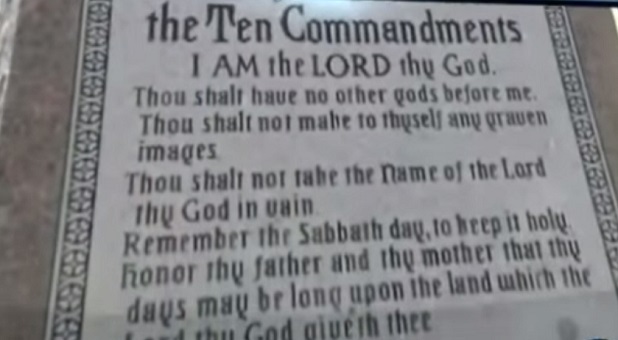Oklahoma Supreme Court Declares 10 Commandments Monument Unconstitutional
The Oklahoma Supreme Court issued an opinion in Prescott v. Oklahoma Capitol Preservation Commission stating that a monument of the Ten Commandments on the Oklahoma capitol grounds is unconstitutional and must be removed. But the fight is not over. Liberty Institute continues to stand beside Oklahoma Attorney General Scott Pruitt, who filed a petition for rehearing, in defense of the constitutionally protected monument. HISTORY OF THE MONUMENT Oklahoma Rep. Mike Ritze proposed legislation for the privately funded monument in 2009. The proposal received bipartisan support from both the state House of Representatives and the Senate, with former Democratic Gov. Brad Henry signing the bill into law. The law specifically authorizes Liberty Institute to prepare and present a legal defense of the monument. Ritze and his family paid approximately $10,000 to have the 6-foot-tall monument built and installed. The monument is modeled after the Ten Commandments Monument displayed outside the Texas state Capitol. In 2004, the U.S. Supreme Court held that an identical Ten Commandments monument was constitutional in Van Orden v. Perry, a case that Liberty Institute assisted the Texas Attorney General in defending. Liberty Institute’s help was soon needed to defend Oklahoma’s monument. AGGRESSIVE ACTION TO SAVE MONUMENT In August 2013, the ACLU filed a state court lawsuit seeking the removal of the Ten Commandments monument from the Oklahoma state capitol grounds. After considerable legal action, a Liberty Institute attorney appeared alongside attorneys from the office of the Oklahoma Attorney General in June 2014 before an Oklahoma state court in support of a motion for summary judgment in favor of the Ten Commandments monument. A judge ruled the monument to be constitutional in October 2014, but the ACLU appealed the case, leading to this decision. WHY TEN COMMANDMENT MONUMENTS ARE CONSTITUTIONAL The state Supreme Court’s ruling last week completely disregards the Oklahoma legislation establishing the monument, which recognizes:
- “That the Ten Commandments are an important component of the foundation of the laws and legal system of the United States of America and of the State of Oklahoma;
- “That the courts of the United States of America and of various states frequently cite the Ten Commandments in published decisions; and
- “Acknowledgements of the role played by the Ten Commandments in our nation’s heritage are common throughout America.”
Additionally, the ruling is inconsistent with previous Oklahoma case law. “The Court’s ‘opinion’ completely ignores—fails to even reference—many, many decades of the Court’s own legal precedent,” Liberty Institute Managing Director of Strategic Litigation Hiram Sasser says. “Never before has the Oklahoma Supreme Court ruled against a passive display with religious content, much less a Ten Commandments monument with a secular purpose.” Sasser warns that if Ten Commandments are removed, it will jeopardize other religious symbols on the capitol grounds. “What will happen to all the Native American symbols and other displays on the Capitol grounds that are significant to various religious beliefs and practices?” Sasser says, citing multiple monuments around the capitol grounds. “Under the Court’s reasoning, because each of these is affiliated with religious imagery, it appears they must be torn down, as well.” “What they’ve disregarded entirely is the connection of the Ten Commandments to our codes of law,” Pruitt said in the Hannity interview. “Clearly there is a purpose here that is different than establishing a particular religion.” A HISTORY OF VICTORY Groups like the ACLU, American Atheists, the American Humanist Association, and Freedom From Religion Foundation are committed to removing these monuments and memorials from public view. But Liberty Institute is committed to enforcing the law that allows appropriate Ten Commandments displays and veterans memorials that are in compliance with the United States Constitution. In the landmark case of Van Orden v. Perry the U.S. Supreme Court found that a Ten Commandments monument on the Texas Capitol grounds was constitutional. Liberty Institute participated in this victory, and believes that the Oklahoma case is a close parallel, therefore resting on the bedrock of settled law. Reprinted from the Liberty Institute.















































